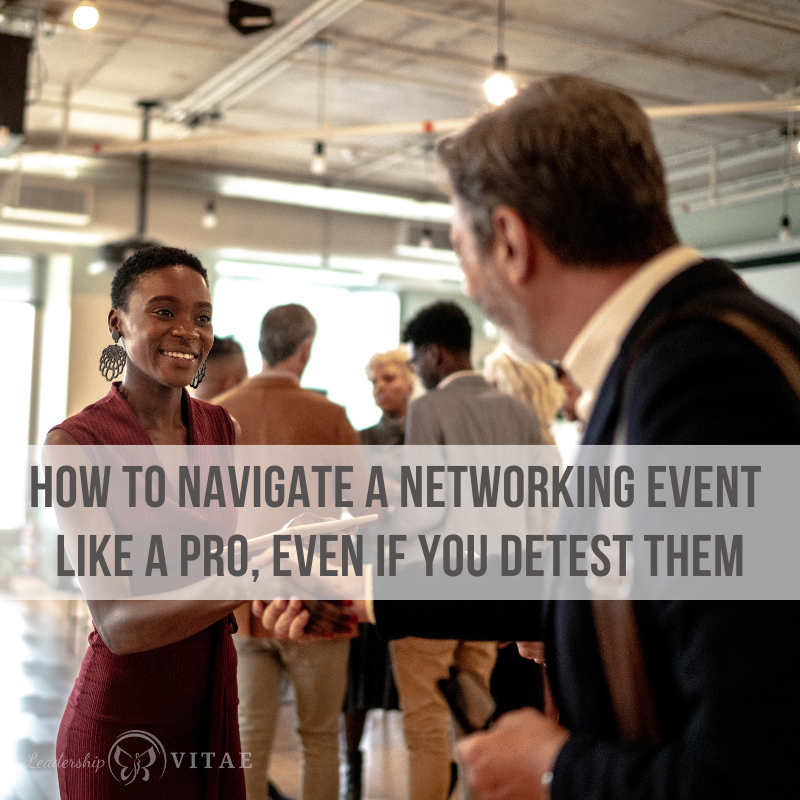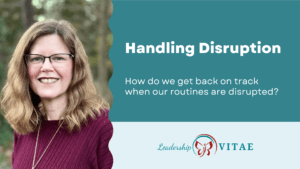
As a coach, I hear a lot from folks that hate networking. Strong term, but when conversations turn to networking, it tends to stir up quite a bit of emotions.
As someone who has also detested networking events for many years, I’ve had to work hard to seem like I’ve mastered them. I say “seem” because I still don’t like them and would rather be doing almost anything else.
Why don’t I like them?
- I’m an introvert and find events with lots of people and noise draining.
- The more pressure there is to “build your network,” the more I resist, as it feels self-serving and transactional to me.
- There are no rules. As someone neuro-spicy, I can “people” when I know the rules. No rules? I’m likely not going.
If any of these are familiar, read on. I’ve learned a few things over the years that can help. The reality is that we can benefit from participating in events we’d rather avoid. It starts with framing why it matters.
What’s the so what?
I’ll never be convinced to network. However, I love community building and helping people. If I can (re)frame an event as an opportunity to either build community or help people, I’m in.
Suddenly, that event that felt transactional or self-serving aligns to my purpose and passion. Now I’m interested.
Consider your “so what.” Thinking about your purpose and passion, how might this event align? By removing the networking label and instead framing it in the context of what matters to us, an event can transform from burden to opportunity.
Have a plan
Walking into a room filled with strangers is definitely not my favorite. It triggers social anxiety, and I’ve turned around and left an event before going in more than once.
If you’re someone that struggles similarly or just doesn’t know how to approach the unknown, it’s important to have a plan.
Ahead of an event, I will give myself two challenges.
- What are the minimum number of meaningful interactions I want to pursue? Maybe it’s one, and that’s still a success.
- What’s the minimum amount of time I want to stay at the event? It could be 15 minutes or an hour. How long doesn’t matter. What does is avoiding walking out of the event before I address challenge #1.
I’ve learned that I’m never the only one unsure how to engage others. Groups of 3 or more people can be a struggle to know when to talk. One or two, however, tend to be a lot easier. When I enter an event where I don’t know anyone, I’ll look for one person standing alone or a group of two. If all groups are 3 or more, I’ll find a spot to stand and wait. It won’t take long before someone else is looking for an easy entrée to conversation. I’m never alone for more than a few minutes.
Another trick is to participate in events that have activities. When we’re standing next to someone doing the same thing we are, whatever that is, we have an automatic topic of conversation.
Ask for help
The number one thing that has helped me shift from avoidance to acceptance when I find myself at events is vulnerability. If I’m invited by someone else to attend an event, I may ask them to hang with me for a few minutes until I get my feet under me. I’ll confess that such events make me nervous and ask if they will help me get the first conversation started.
If I’m in a room of strangers, I might ask the first person I talk with if they know the crowd. If so, I’ll ask if they can introduce me to the next person. Knowing my so what means knowing why I’m there. If I’m trying to find more pro-bono coaching opportunities, for example, maybe I’ll ask if they know anyone who works in a non-profit that could benefit.
I swear most folks are looking for groups of two because they are easier to interact with than larger groups. If we engage with one person when we arrive, someone else will likely join. After a bit, one may make an excuse to break away, creating space for a new person to come over.
While that’s been my experience in crowds, being willing to ask for help can go a long way to getting the initial stress out of the way.
The true secret
While networking events will never be my favorite, there’s one thing that I try to remember when I find myself attending one. I’m the only one thinking about me.
That’s right. For all the anxiety of walking into a roomful of strangers or being worried about how to enter a conversation, no one is looking at me funny. They aren’t judging or talking about me. Not a one. They’ve got their own worries and their own internal narrative shaping how they are showing up.
Ironically, those closest to me – who know my struggles with unscripted interpersonal interactions – don’t buy it. They think I AM a pro, who can navigate whatever room I’m in with grace and poise. They can’t see inside my mind to the self-talk and panic that’s going on.
And that’s the ultimate truth. While we may worry about how we will be perceived, we tend to judge ourselves more harshly than anyone else would. Because they are busy doing the same. We are looking at someone, wondering how we can be that engaging, and someone else is looking at us asking themselves the same question.
The next time you’re tempted to avoid a networking event, I encourage you to try these steps. Reframe the opportunity, have a plan, and ask for help. Lastly, remember that no one is thinking about you as much as you are.
I’d love to hear your own experiences with networking events and techniques you’ve used to navigate them. Please share them in the comments.








